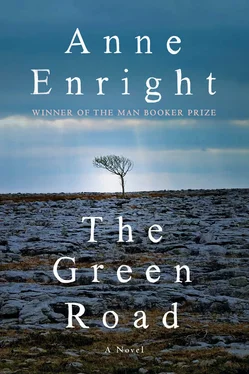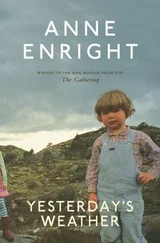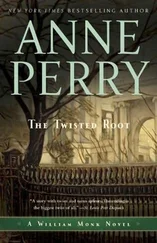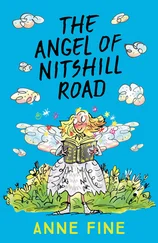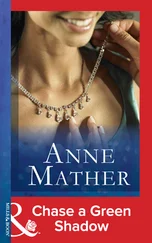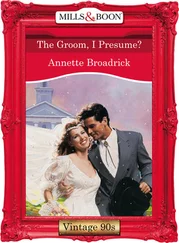Pat Madigan always knew who he was , of course, or who he should be .
Well good for him.
She only brought it up now to forget it. Rosaleen had married beneath her. There was no point fooling herself about that now. It was considered a mistake at the time. But she had flown in the face of public opinion, she had defied them all.
A love match. That was the phrase people used, but Rosaleen thought love had little enough to do with it, that it was an animal thing. Three weeks after her father’s death. Not that she was ashamed of it. There were things country men knew that men from the town had no clue about. These young people with their little events below the waist, thinking they were just marvellous. Whatever it was Bill Clinton said about sexual relations, she couldn’t agree more, because when they were young and in their beauty, which was considerable, Rosaleen Considine and Pat Madigan went to bed for days. That was what she called sex. Days they spent. It was a lot more than pulling down your zip while you were talking on the phone.
So what do you think of that?
‘Hah!’
In defiance of the night, she said it out loud.
‘What do you think of that?’
The bed was above her, ready to fall through the plaster, the place where her father died and her mother died, the place that later became her bed with Pat Madigan, when they moved into that room, and a kind of curse in it for the next while: no child conceived there except a few miscarried things, until Emmet was finally started and then Hanna. The bed where Pat Madigan himself finally died, his body wasted by the cancer until all that was left of him was the scaffolding. But, my goodness, he made a great ruin, for having been so well built, those big hinging bones, the joints getting larger and the cheekbones more proud, as the meat melted back and spirit of the man broke through.
He went on a Tuesday night, and they had the lid down by Wednesday afternoon: Rosaleen made sure of it. Planted on the Thursday in a terrible downpour and not one of the mourners allowed to care that they were soaked through. The days and weeks these people spent talking about the weather. Discussing it. Predicting it. The months and years.
It rained. They got wet.
How terrible.
Her father was buried in August, one hot summer, and of course John Considine was too big a man to be shoved into the earth, like a blown calf. They had to wait for priests and monsignors, not to mention his good friend, the Bishop of Clonfert. But something had gone off in her father, it spread through him in the days before he died, and it kept going off for the three or four days after, as men were summonsed from Dublin and from Liverpool; one couple, whoever they were, arriving, almost festive in their own motor car. Various nuns sat vigil by the coffin in the front room and one of them stroking her father’s forehead as she talked to Rosaleen. Vigorously. Gazing at his dead face. Stroking it. Pushing it.
‘Ah God love him,’ she said. ‘Ah, the crathur. Ah the poor man.’
Brushing his hair back, over and over. The smell of incense, of roses and lavender brought in from the garden, honeysuckle soap on Rosaleen’s hands, and her father’s nose, as the days passed, rising higher away from his own face, as though in disdain. Rosaleen thought the stroking nun was mad in the head. And she thought her own virginity was going off inside her, that her womb would rot, she had left it so long, turning one or other suitor down for reasons that were always clear at the time. A brace of young men, or wealthy men, standing in the room where her father lay now, adjusting their ties. She was much courted, John Considine’s daughter. And in the end, she gave it away to Pat Madigan in a hayrick in Boolavaun; her body, later that night, alive and tormented by tiny prickles and welts because, Pat said, the hay was new to her skin.
Forty acres of rock and bog. That is what she got. And Pat Madigan.
The door to the front room was closed now. Her father’s ghost was a cold twist of air turning on the broken hearth. Her father was a moment’s anxiety, as she passed the study, Hush hush! your father’s working . Fellow of the Pharmaceutical Society, Knight of Columbanus, Irishman, scholar, John Considine of Considine’s Medical Hall. Rosaleen looked in at her own narrow bed and wondered, not for the first time, whether her father was actually important, or if these men, with their big thoughts about the world, were all equally small.
There was a dishcloth going off in the sink — she could catch the smell of it from the doorway — and the thing they put under the stairs, the new bathroom that looked so shining and so sanitary, was only another drain, really, opening into the house. The kitchen table was laden with grocery bags, the television blattering away. The evening was ahead of her, with maybe a book to pull her through it. Any book would do. She used to read while the place fell apart around her. And she still read. She liked it.
But first she went to the drawer full of papers. The guarantee form, never posted, for the washing machine before last. Old cheque-books, one end thick with accusing stubs, the rest slapping empty. Things to do with tax. Forestry stuff for the land at Boolavaun. She found the woman in the red room and then another postcard from Dan, a thing by Kandinsky with two horsemen against a background that was also red, and something about the stretch of the animals’ necks that showed the wildness and difficulty of the journey they were embarked upon.
Rosaleen held it up to the light.
Beauty, in glimpses and flashes, that is what the soul required. That was the drop of water on the tongue.
The evening was just beginning. If she made a cup of tea now, she could have a little sandwich with it; something small to stop her waking in the middle of the night and wandering out into the hall, wondering where she was, though she was never anywhere else but here.
Where else would she be?
But there was something wrong with the house and Rosaleen did not know what it was. It was as though she was wearing someone else’s coat, one that was the same as hers — the exact same, down to the make and size — but it wasn’t her coat, she could tell it wasn’t. It just looked the same.
Rosaleen was living in the wrong house, with the wrong colours on the walls, and no telling any more what the right colour might be, even though she had chosen them herself and liked them and lived with them for years. And where could you put yourself: if you could not feel at home in your own home? If the world turned into a series of lines and shapes, with nothing in the pattern to remind you what it was for.
It was time. She would doze in the chair by the range, tonight, she would not lie down. And in the morning she would walk down the town, over the bridge to the auctioneer’s. She could get a price for it, apparently; the days when people were put off by the heating bills were gone. The auctioneer was a McGrath — of course — a brother of Dessie, who married her daughter. He had to wet his lips each time she passed; his mouth went so dry at the sight of her. Well he could have it. Let the McGraths pick over the carcass of the Considines, they could have Ardeevin and the site at Boolavaun, she would move in with Constance, and die in her own time.
They had all left her. They deserved no better.
The gutters falling into the flowerbeds, the dripping taps, the shut-up rooms that she had abandoned, over the years. The pity of it — an old woman.
Rosaleen took up the little stack of Christmas cards. She opened the first one:
My darling Dan,
I think of you often, and just as often I smile. I miss your old chat.
All my love,
Your fond and foolish Mother,
Читать дальше
